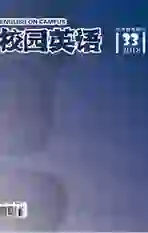Translation of Culturally—loaded Words from Perspective of Power Discourse in the Context of Globalization
2018-11-26刘雪莹
I. Introduction
In the context of cultural globalization, Western culture is trying to force them to influence Eastern culture. Translation is one of the means by which we can use the power of spreading Eastern culture to the world and maintaining our proper discourse power in world cultural exchanges. Culturally-loaded words can best represent the cultural characteristics of a nation. The translation of culturally loaded words is an effective means of maintaining a national cultural identity. There are usually two strategies for translating culturally loaded words: foreignization and Domestication.
II. Power Discourse and Translation
The so-called power discourse proposed by Foucault refers to all control and power. Discourse is the subject of thought and writing, so translation is a key part and perfect choice for disclosing the power network below. In translation practice, the power difference between strong culture and weak culture leads to the discourse imbalance in the translation process, the choice of source text, the choice of translation strategy, and even the translation theory between the two cultures. There is no doubt that the translation strategy used is subject to power constraints. The relationship between power and translation is obvious and two-way. On the one hand, translation is manipulated by power. On the other hand, translation can demonstrate its power in the process of intercultural communication.
III. Culturally-loaded Words
Culturally-loaded words refer to words and expressions that are rich in cultural or cultural connotations in a particular culture. They carry a unique cultural carrier that often hinders cross-cultural communication.
Culturally loaded words we can infer that there is always a cultural imbalance between English and Chinese. For example, “竹(bamboo)” is often used to express the firmness and integrity of a persons character, such as “胸有成竹” and “勢如破竹”, but “bamboo” is just the name of a certain plant, and there is no associative meaning in English..
IV. Translation Strategy for Culturally-loaded Words from The Perspective of Power Discourse
Domestication is the term used by Venuti to describe translation strategies, using a transparent, fluid style to minimize the strangeness of the target language readers to foreign languages; alienation is the term deliberately destroying the target convention by preserving the original foreign object.
Venuti (1995) believes that the alienation strategy helps to break the target norms, retain the original heterogeneous elements, eliminate inequalities in cultural exchanges, resist cultural hegemony, and enable readers to fully experience foreign cultures and customs. However, the purpose of the domestication strategy underestimates the readers subjective initiative and deprives the target readers of their knowledge of foreign cultures and customs.
V. Foreignization Translation Strategy for Chinese Culturally-loaded Words
In the context of globalization Chinese translators should try to retain the unique characteristics of Chinese culture and help Chinese culture to enjoy its due power of discourse in world cultural exchange. And foreignization is the better strategy .
Specific approaches like (1)Transliteration, which is transcribing words into corresponding letters of another language.清明节can be translated as: Qingming- a traditional Chinese holiday to commemorate the dead observed in spring. When first translating, we add supplementary explanation.(2)Literal Translation.We mean the word-for-word translation of the source language version. “纸老虎” can just be literally translated as “paper tiger”, both the original image and the rhetoric characteristics retained and vividly presented for target readers. (3)Transliteration or Literal Translation with explanation. There is a need to add some in-text explanation to the translation in order to make sense. “头戴纱帽” should be translated as “wearing an official gauze cap”,in which the explanatory “official” should be added, because in Chinese culture, “gauze cap” is not only a kind of cap but also a symbol of official rank. If we only translate“纱帽”into “gauze cap”, the cultural flavor will be lost. (4) Descriptive Translation (Paraphrasing).It refers to a way of describing things or actions so it is also paraphrasing. “請安”,an etiquette of Chinese, is translated by Yang Xianyi in “A Dream of Red Mansion” into “went down on ones knees in salute”.
【作者简介】刘雪莹(1993.11010-),女,汉族,现就读于西安外国语大学英文学院2016级翻译学专业,硕士研究生,研究方向:翻译理论与实践。
